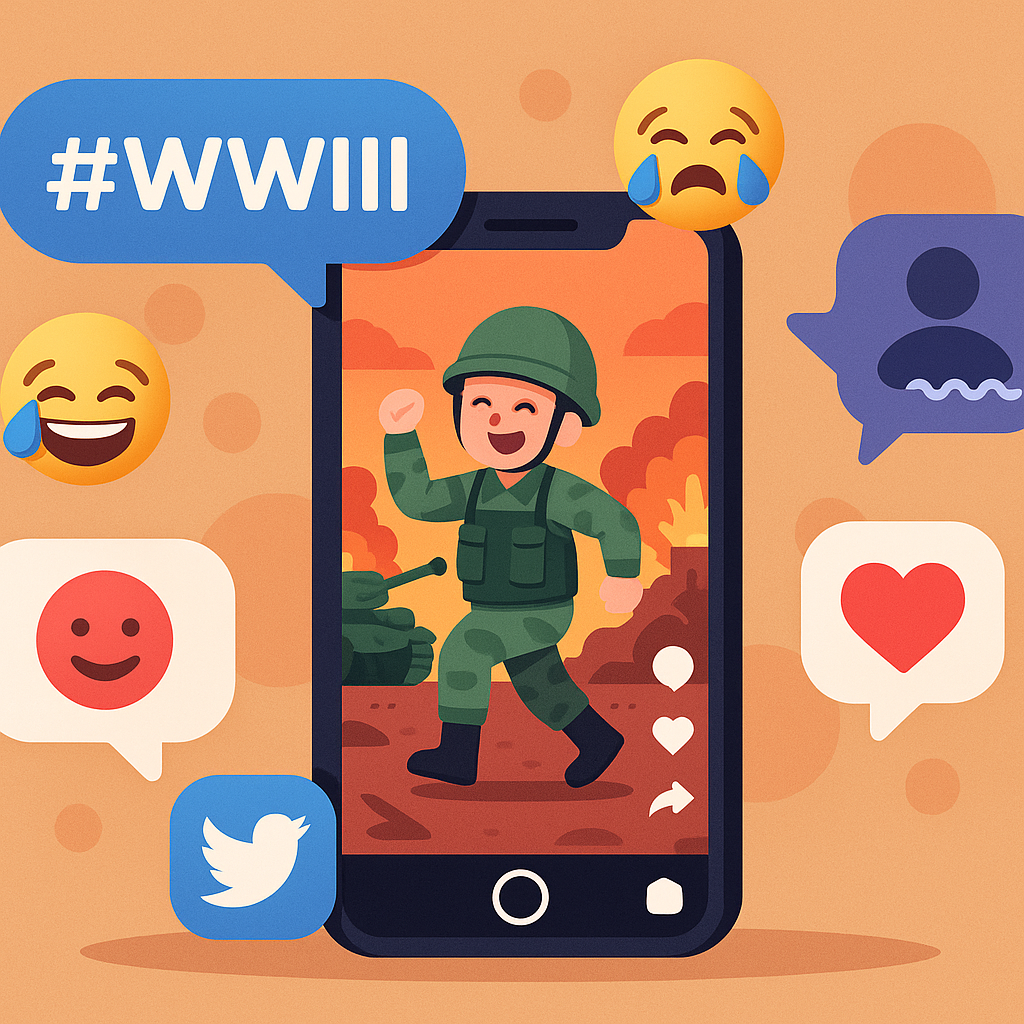Date: June 22, 2025
Location: Global (Social Media Platforms)
Category: Culture | Social Media | Youth Psychology

In the wake of escalating military tensions between Iran, the United States, and key Western allies, the world braced itself for another potential global crisis. But while news anchors spoke in solemn tones and politicians issued grave warnings, a different kind of reaction erupted online — one marked by sarcasm, satire, and viral memes.
Within hours of the U.S. strike on Iranian nuclear facilities, the hashtag #WWIII became the number one global trend on X (formerly Twitter), followed closely by #DrafteeStarterPack, #GenZInCombat, and #BunkerFits on TikTok and Instagram.
Rather than express fear or political outrage, Gen Z users—many born after 9/11 and raised on digital chaos—turned to humour as their weapon of choice.
War News Meets Meme Culture
From joking about enlisting just to “access military WiFi,” to viral TikTok soundtracks set to “running from the draft,” the response has been both absurd and telling. Some shared mock “letter from the government” videos, while others created hyper-stylised “WWIII lookbooks” featuring camouflage cargo pants, sunglasses, and bunkers as aesthetic zones.
One viral tweet with 1.8M views reads:
“If I’m getting drafted for WWIII, at least let me pick my team like in school dodgeball 💀💀💀”
Another TikTok video, captioned “POV: you get drafted but you’re in a musical” shows users doing choreographed dances in army fatigues.
Expert Reactions: “This Is How They Cope”
Many older generations have struggled to make sense of such irreverence in the face of a global crisis. Some have called the humour insensitive, even disrespectful to the seriousness of armed conflict.
But psychologists and youth experts disagree.
“Gen Z isn’t laughing because they don’t care — they’re laughing because everything is overwhelming,” says Dr. Lina Rahman, a youth psychologist and digital behavior analyst.
“This is a generation that came of age during the COVID-19 pandemic, climate emergencies, mass shootings, AI displacement fears, and a 24/7 crisis news cycle. Humor is their survival instinct.”
She notes that using humour, satire, and memes to reclaim fear is both a form of digital resistance and a coping strategy.
The Internet’s New Language of Anxiety
The phenomenon isn’t new. Similar meme-based responses were seen during:
- The start of the Russia-Ukraine conflict
- The COVID-19 lockdowns
- The collapse of global banks in 2023
What’s different now is the sheer speed and creative complexity of the memes. On platforms like TikTok, creators are blending war-related content with popular aesthetics like “cottagecore,” anime filters, and dystopian K-drama edits — essentially turning crisis into content.
“Gen Z doesn’t wait for official narratives. They remix reality in real time,” says Ria Kapoor, a digital culture researcher at Mumbai’s Tech and Society Institute.
Generational Divide on Display
The humor may be lost on older viewers, who are more likely to associate conflict with historical trauma. But for Gen Z, everything is content, even their fear.
“The scariest part is not war—it’s not being able to laugh through it,” says Kritika Das, a 22-year-old student from Delhi.
“We’ve seen so much. This is just our way of not feeling numb.”
Why This Story Matters
- Trauma Expression: Gen Z’s online behaviour is a mirror of their mental health, showing how they process uncertainty, fear, and loss of control.
- Cultural Shift: Humour has become a digital armour, helping young people manage crises they feel powerless to stop.
- Communication Gap: The response highlights a growing disconnect between generations in how global events are interpreted and internalized.
- Platform Power: With platforms like TikTok, Reddit, and X driving narratives, the way youth view war and politics is more meme-based than mainstream media-based.
Final Thought: “Laughter in the Dark Is Still Resistance”
For a generation that has lived through more “once-in-a-lifetime” events than any in recent history, joking about the apocalypse doesn’t mean they don’t care—it means they’re still trying to feel something.
In 2025, when traditional media delivers fear, Gen Z opens TikTok and delivers satire.
And that, in itself, may be one of the most honest ways to face a fractured world.
#wwiii #genzmeme #digitalcoping #memecrisis #genzinwar #tiktoktrends2025 #youthculture #mentalhealthawareness #socialmediaresponse #tripura24news
